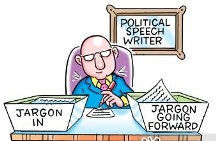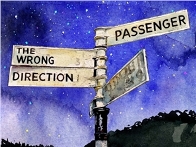 If you’re a political speechwriter the easiest thing to write for your candidate to say is, “I don’t like the direction America is heading.” It’s a chestnut we hear every election cycle because a lot of people never seem to like the way we’re heading.
If you’re a political speechwriter the easiest thing to write for your candidate to say is, “I don’t like the direction America is heading.” It’s a chestnut we hear every election cycle because a lot of people never seem to like the way we’re heading.
It’s what candidates generally say when they’re running against a candidate whose party is in the White House. Clinton used it against Bush, Bush against Gore, and Obama against McCain. We hear it in congressional and senate races, too.
It resonates because it always appears that things are getting worse. Yet, we seem to miss the irony in the fact that these are the very days that future candidates will one day wistfully recall as the better times we need to get back to.
We all pretty much agreed that we didn’t like heading into a deep recession in 2008 and Barack Obama won by a substantial margin, but, the refrain, “I don’t like the direction America is heading” is being trotted out again.
Personally, I’m not happy with many of America’s foreign policies, but I’m never happy with many of America’s foreign policies.
with many of America’s foreign policies.
In domestic matters unemployment figures are below pre-recession levels, the stock market has reached new highs, corporate profits are healthy, more Americans have healthcare coverage, environmental concerns are getting more attention, and civil rights are front and center.
Oh, we have work to do! The environment and civil rights remain critical, we have to build the middle class, create upward mobility for working Americans and fair pay for women. We also have to tackle affordable education, but all of these things are on the table and that indicates a pretty good direction. At least good enough to make “I don’t like the direction America is heading” a fairly thin statement.
But polls are showing that it still works and that suggests a continuing truism; the truth is not what the public is looking for.
Political consultants have known this for decades, if not centuries. Voters are looking for feelings, not facts. The most blatant illustration of this in my lifetime came from a  Democratic campaign when a Lyndon Johnson commercial showed a nuclear explosion insinuating that Barry Goldwater was so extreme that his presidency could end the world. It played on fear without any substantive reason to make that connection.
Democratic campaign when a Lyndon Johnson commercial showed a nuclear explosion insinuating that Barry Goldwater was so extreme that his presidency could end the world. It played on fear without any substantive reason to make that connection.
A young Karl Rove must have been taking notes because he emerged as the master of modern political rhetoric. When Ann Richards seemed unbeatable as governor of Texas, Rove felt otherwise. He knew that people vote on emotional connections and not substantive ones. When crime was down in every major category in Texas under Richard’s watch, he had his candidate, George W Bush, say, “Ann Richards says crime is down in Texas, but I don’t believe that. I don’t feel safer. Do you?”
 And enough Texans rose to their feet and said, “No! We don’t!” Never mind that they actually were and statistics were there to prove it, reactive fear came to the polls and Richards lost.
And enough Texans rose to their feet and said, “No! We don’t!” Never mind that they actually were and statistics were there to prove it, reactive fear came to the polls and Richards lost.
Truth doesn’t matter.
Last year in a Senate race a candidate’s support for veterans was disputed by challenging his committee attendance. The accusing candidate gained from the attack, but the truth was, few politicians worked harder for veteran’s rights and benefits than the candidate who was under fire.
The playbook has been written and candidates who use it best fare better than those who think that facts will rule the day.
Today, some media uses the playbook by taking dangerous international concerns and whipping people into a froth of fear to, once again, move opinions with feelings and not with rational thinking.
Truth doesn’t matter.
Yet, we know in our hearts that truth does matter. And when it’s rendered irrelevant in our rhetoric, consequences will rise in our reality.
When the truth of justice is swept aside, fear is manifested. When the truth of generosity is ignored, we give rise to greed. When we are blind to the truth that bigotry is evil, we are complicit in the hate it reveals.
 Truth matters, and until we give it more importance in elections, we will undoubtedly be heading in the wrong direction.
Truth matters, and until we give it more importance in elections, we will undoubtedly be heading in the wrong direction.